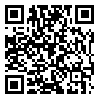Volume 27, Issue 3 (10-2021)
Back to this Issue |
Back to browse issues page
Download citation:
BibTeX | RIS | EndNote | Medlars | ProCite | Reference Manager | RefWorks
Send citation to:



BibTeX | RIS | EndNote | Medlars | ProCite | Reference Manager | RefWorks
Send citation to:
Dehghan Nayeri N, Kesheh Farahani M, Hajibabaee F, Sheikh Fathollahi M, Senmar M. Effect of risk management program on the rate of medication errors among intensive care unit nurses. Journal of Hayat 2021; 27 (3) :318-335
URL: http://hayat.tums.ac.ir/article-1-4291-en.html
URL: http://hayat.tums.ac.ir/article-1-4291-en.html
Nahid Dehghan Nayeri1 

 , Maryam Kesheh Farahani2
, Maryam Kesheh Farahani2 

 , Fatemeh Hajibabaee2
, Fatemeh Hajibabaee2 

 , Mahmood Sheikh Fathollahi3
, Mahmood Sheikh Fathollahi3 

 , Mojtaba Senmar *
, Mojtaba Senmar * 

 4
4


 , Maryam Kesheh Farahani2
, Maryam Kesheh Farahani2 

 , Fatemeh Hajibabaee2
, Fatemeh Hajibabaee2 

 , Mahmood Sheikh Fathollahi3
, Mahmood Sheikh Fathollahi3 

 , Mojtaba Senmar *
, Mojtaba Senmar * 

 4
4
1- Dept. of Critical Care Nursing and Nursing Management, School of Nursing and Midwifery, Tehran University of Medical Sciences, Tehran, Iran; Nursing and Midwifery Care Research Center, School of Nursing and Midwifery, Tehran University of Medical Sciences, Tehran, Iran
2- Dept. of Critical Care Nursing and Nursing Management, School of Nursing and Midwifery, Tehran University of Medical Sciences, Tehran, Iran
3- Rajaie Cardiovascular Medical and Research Center, Iran University of Medical Sciences, Tehran, Iran
4- Dept. of Nursing, School of Nursing and Midwifery, Qazvin University of Medical Sciences, Qazvin, Iran ,senmarmojtaba@gmail.com
2- Dept. of Critical Care Nursing and Nursing Management, School of Nursing and Midwifery, Tehran University of Medical Sciences, Tehran, Iran
3- Rajaie Cardiovascular Medical and Research Center, Iran University of Medical Sciences, Tehran, Iran
4- Dept. of Nursing, School of Nursing and Midwifery, Qazvin University of Medical Sciences, Qazvin, Iran ,
Abstract: (2466 Views)
Background & Aim: Patient safety in general and medication errors in particular are the important indicators of hospital care quality. Risk management is an important and fundamental approach to preventing events caused by medication errors. The aim of this study was to determine the effect of risk management program on the rate of medication errors among intensive care unit nurses.
Methods & Materials: The present study was a non-randomized pre-test, post-test study with a control group, conducted in 2020 in two hospitals in Tehran. The hospitals were randomly assigned to either an experimental group or a control group. According to the inclusion and exclusion criteria, 150 nurses (75 nurses in each group) were selected by the convenience sampling method. For the experimental group, a risk management program was implemented. Data collection tools included the nurses’ demographic questionnaire, the 14-item Wakefield medication error self-reporting questionnaire, and the nurses’ medication quality checklist. Data was collected before and after the intervention and analyzed by the SPSS software version 16 using descriptive and inferential statistics.
Results: The results of independent t-test showed no statistically significant difference between two groups in demographic information and the rate of medication errors before the study (P>0.05). After the intervention, difference in the rate of medication errors was statistically significant between the two groups (P<0.005), indicating a decrease in medication errors in the nurses of the experimental group compared to the control group. The results also showed that the rate of medication error observed in nurses was significantly higher than the error reported by them (P<0.001).
Conclusion: The results showed that the implementation of risk management program was effective in reducing nurses’ medication errors. Implementing a risk management program is recommended to nurses as a way to promote safe medication and achieve safe and desirable nursing care.
Methods & Materials: The present study was a non-randomized pre-test, post-test study with a control group, conducted in 2020 in two hospitals in Tehran. The hospitals were randomly assigned to either an experimental group or a control group. According to the inclusion and exclusion criteria, 150 nurses (75 nurses in each group) were selected by the convenience sampling method. For the experimental group, a risk management program was implemented. Data collection tools included the nurses’ demographic questionnaire, the 14-item Wakefield medication error self-reporting questionnaire, and the nurses’ medication quality checklist. Data was collected before and after the intervention and analyzed by the SPSS software version 16 using descriptive and inferential statistics.
Results: The results of independent t-test showed no statistically significant difference between two groups in demographic information and the rate of medication errors before the study (P>0.05). After the intervention, difference in the rate of medication errors was statistically significant between the two groups (P<0.005), indicating a decrease in medication errors in the nurses of the experimental group compared to the control group. The results also showed that the rate of medication error observed in nurses was significantly higher than the error reported by them (P<0.001).
Conclusion: The results showed that the implementation of risk management program was effective in reducing nurses’ medication errors. Implementing a risk management program is recommended to nurses as a way to promote safe medication and achieve safe and desirable nursing care.
Send email to the article author
| Rights and permissions | |
 |
This work is licensed under a Creative Commons Attribution-NonCommercial 4.0 International License. |



